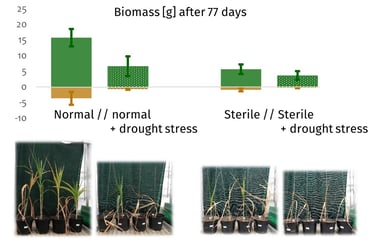Why a healthy soil microbiome is essential for agriculture
Insights from the austrian DaFNE pilot project
1 min read


Background
A groundbreaking pilot project was carried out as part of the Austrian DaFNE programme (Federal State Cooperation for Agricultural Research). The focus was to explore the importance of the soil microbiome for plant resilience – in particular by comparing undisturbed healthy soils and sterilized soils that had been stripped of their microbial community.
Setup
Four representative maize field plots in Upper and Lower Austria were examined.
Part of the soil was sterilized using gamma radiation to greatly reduce microbial diversity.
The soils were then planted with maize in the greenhouse under controlled drought conditions.
Key Findings
Sterilized soil shows similar loss in biomass as compared to plants exposed to water shortage:
Lower chlorophyl amount
Massively reduced plant growth
Lower water retention
Higher grade of erosion
Result
Soil colonization with microorganisms is not a nice-to-have, but a central factor for stability, resilience and yield.
Integrate organic soil care into systemic concepts – for example through catch crops, organic fertilisation or microbiological preparations.
Source: BodenMikrobiom: Bodenmikrobiome und wichtige Ökosystemleistungen – ein Pilotprojekt - BMLUK DaFNE (https://dafne.at/projekte/bodenmikrobiom)


Innovation & Technology
Probiotic soil activators for sustainable agriculture.
Contact
Newsletter
office@solvaterra.com
© 2025. All rights reserved.
